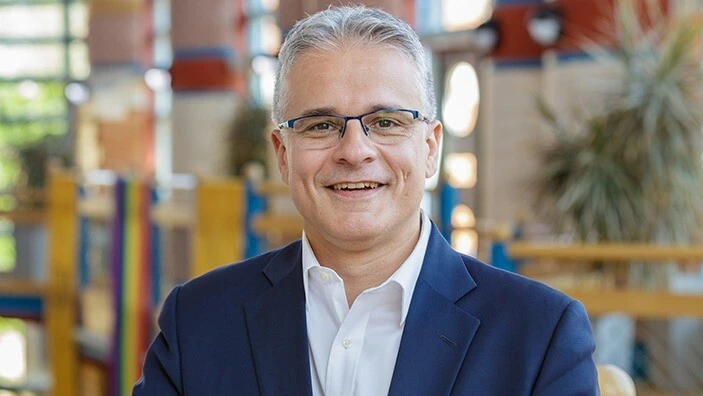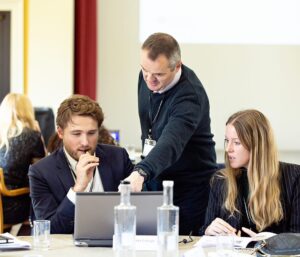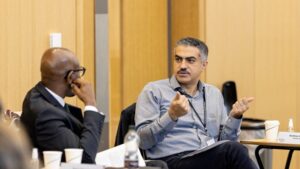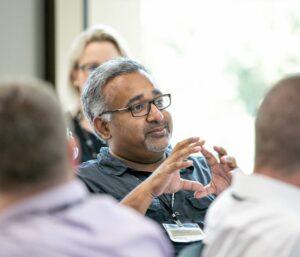Leading Strategic Projects Successfully
Enhance your strategic project execution skills: learn to thrive in the face of complexity and uncertainty, manage relationships and drive change and value.
Upcoming programme dates to be confirmed.
Overview
Managing stakeholders. Motivating project teams. Navigating complexity. Understanding risk. An effective project is about more than just good planning and scheduling. Organisations rely on managers to lead and execute different strategic projects such as mergers, acquisitions, product launches and strategic realignments – in line with their broader business objectives.
Anticipate unforeseen developments, drive change and create value. Enhance your strategic project execution skills on the Cambridge Judge Business School’s highly interactive programme, Leading Strategic Projects Successfully. Exploring simulations, exercises, role-playing, case studies, discussions and lectures, learn from senior faculty who have a wealth of experience with diverse organisations at moments of strategic change and leave with a clear understanding of practical tools to apply directly to your own projects.
Benefits and career impact
Projects act as a vehicle for different organisational initiatives. They can also throw up major challenges. Learn to master complex and uncertain situations, motivate high-performance project teams and manage your stakeholders.
- Deliver your projects to meet organisational objectives, on time and on budget.
- Learn the fundamentals of better planning and control.
- Overcome complexity and uncertainty to cope with challenging external environments.
- Expertly manage project teams and stakeholder relationships.
- Understand strategy cascading.
- Gain a digital certificate of completion from Cambridge Judge Business School Executive Education.
- Rely on your managers to lead and execute strategic projects.
- Realise your broader organisational objectives on time and on budget.
- Take advantage of new opportunities, drive change and create value for your business.
Hello. My name is Kishore Sengupta. I’m a Professor in Operations at Cambridge Judge Business School at the University of Cambridge. My current research, teaching, and other activities are focused on managing complex projects, managing complexity in organisations, and the future of work.
I have been a faculty member at the Cambridge Judge Business School for the past 9 years. Before coming here, I was on the faculty at INSEAD in France and Singapore and in schools in the United States and Hong Kong. In my research and teaching, I worked closely with organisations in different sectors, especially in technology and services.
A focus on strategic projects
Organisations execute the strategy through projects such as entering new markets, launching new products, mergers and acquisitions. The effectiveness of strategic projects is critical to organisations. This 3-day programme focuses on precisely such projects.
Projects are often thought to be about implementing complex details using precision, complicated tools and techniques. While these undoubtedly matter, the success of strategic projects hinges on how the project’s leader, the projects team, and external players conceive a project and work towards its execution.
One common pitfall is that managers are good at tracking activities. But they are less good at understanding and working with the actors behind the activities – team members, stakeholders, and partners. A second pitfall is the one I’ve mentioned earlier. They do not adapt the management approach to fit the nature of the project.
In other words, you can get a lot of details right but can still fail because the project is not diagnosed and framed correctly. The objective of this programme is to help leaders conceive, plan, and execute the project effectively. Our participants are from the mid to senior levels of organisations with responsibility for such projects, either running them directly or exercising oversight.
Curriculum
We examine an interlocking set of topics that characterise such projects – complexity, uncertainty, novelty, engaging stakeholders, and the connection of projects with organisational strategy. We adopt a managerial, rather than technical, perspective, focusing on issues that concern those who lead projects. We also consider the impact on those who may have oversight and those who will be required to implement new initiatives.
The sessions are highly interactive and leverage the experiences of the participants. The pedagogies combine exercises, simulations, cases, vignettes, and role plays with lectures to deliver the key learnings. The faculty members who have deep expertise in the topics are highly skilled at combining theory with practice so that participants have clear frameworks and takeaways after every session.
Several participants have returned to the programme to share their experiences with the community through new cases, for example, discussions, or guest lectures. I hope that this video has provided you with useful information. Please let us know your questions. Thank you.
Learn more about the programme from our faculty, Kishore Sengupta
Intuitively we all know what defines a complex project but being given the tools to break a difficult project down into its constituent parts (and clearly articulate the challenges) is incredibly useful in helping to better govern/manage towards a successful outcome.
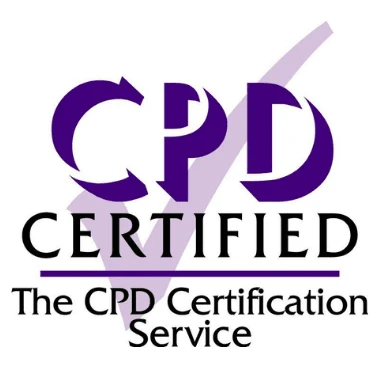
This programme is certified by the CPD Certification Service. It may be applicable to individuals who are members of, or are associated with, UK-based professional bodies.
Programme content
In 6 dynamic modules, explore content linked to your organisational context, reflecting the wider business environment, and relevant to your future aspirations.
Module 1: What is a project?
- Distinguish between projects and processes.
- Recognise the management approaches required for different projects and their goals.
Module 2: Dealing with interdependency and complexity
- Manage complex issues and diverse, conflicting requirements.
- Analyse unforeseen developments.
- Learn to navigate a high degree of uncertainty when faced with difficult external environments.
Module 3: Stakeholder management simulation
- Develop effective stakeholder consultation strategies.
- Create a communication plan that reflects cultural preferences.
- Map and use influence networks to balance conflicting stakeholder interests.
Module 4: Stakeholder management: frameworks and integration
- Identify key stakeholders and diagnose their networks.
- Profile stakeholders on where they stand and how they affect the project.
- Define rational trade-offs and compromises to execute your stakeholder management plan.
Module 5: Managing novel projects
- Identify the managerial challenges of breakthrough innovation projects in large organisations.
- Assess the limitations of traditional risk mitigation frameworks.
- Apply selectionism and learn to managing a novel project.
Module 6: Strategy and projects
- Align projects with strategy.
- Articulate a project’s strategic contribution successfully.
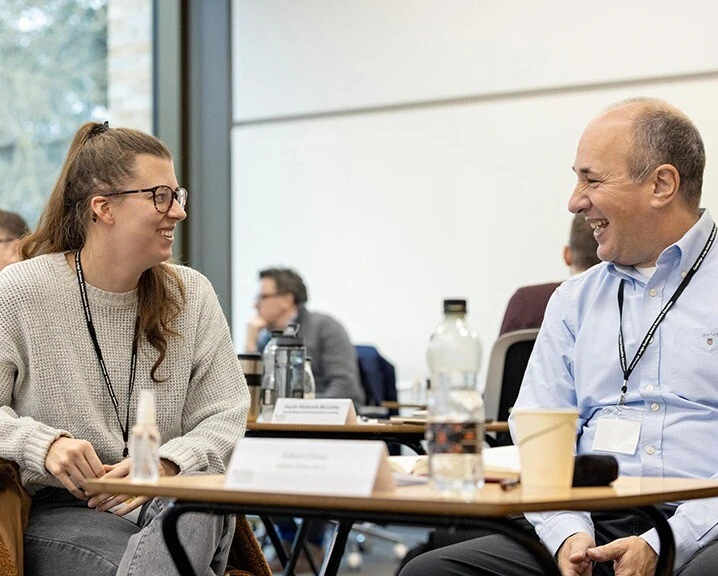
How you learn: Face-to-face
Enjoy 3 inspirational days in the historic and beautiful city of Cambridge, a world-renowned centre of cutting-edge knowledge creation. Engage with faculty and peers in person and take time away from home and office to focus on your learning and networking objectives. Join ‘Cambridge Union’-style debates, hear from guest speakers and faculty, interact with carefully selected peers and experience group exercises, role-play and discussion both in and outside class.
Who attends
The Leading Strategic Projects Successfully programme is tailored for senior to mid-level executives with at least 5 years of industry experience, in a project focused role and involved in:
- managing complex or novel projects
- new product or service development
- change management initiatives, mergers and acquisitions, or organisational restructuring
- breakthrough projects, creating new business models and setting up a new business or subsidiaries
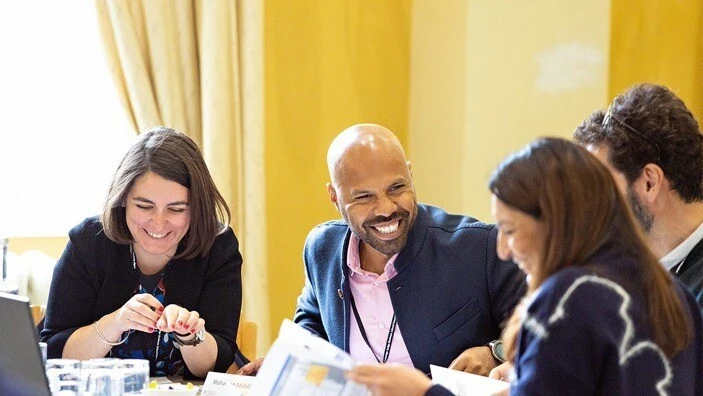
Faculty and speakers
Learn from our world-class faculty who bring fresh insights from their leading-edge research into all of our Executive Education programmes.
The Academic Programme Director (APD) for the Leading Strategic Projects Successfully programme is Professor Kishore Sengupta.
PhD (Case Western University)
Christoph Loch
Christoph Loch
Professor of Operations and Technology Management, IESE Business SchoolFormer Director, Cambridge Judge Business School
Stylianos (Stelios) Kavadias
Margaret Thatcher Professor of Enterprise Studies in Innovation and GrowthCo-Director of the Entrepreneurship Centre
PhD (INSEAD)
Why Cambridge Judge Business School?
Related programmes
Leading Strategic Projects Successfully belongs to our Managing Organisations-topic executive education programmes. Here are a selection of related programmes:
Steering Complex Projects
Gain the confidence and expertise to take on novel and multifaceted projects in your organisation factoring in key issues such as strategy negotiation and incentive structures – all within a wider strategic context.
Strategic Decision-Making for Leaders
Learn to think strategically, lead through uncertainty and improve the quality of your decision-making at every level.
The Cambridge Negotiations Lab – Cyprus
Manage the negotiation process with real confidence. Draw on case studies, role play and real-world experiences, and gain the strategies and tactics to succeed in any negotiating environment.
Speak to a programme advisor
If you have any questions or would like to discuss how this programme could benefit you or your organisation, please get in touch with the programme advisor.





